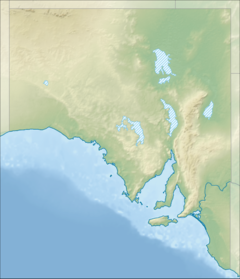Pirie–Torrens corridor
Appearance
| Pirie–Torrens corridor | |
|---|---|
| Location | |
| Country | Australia |
| State | South Australia |
| Region | Far North |
| Physical characteristics | |
| Source | Lake Torrens |
| • coordinates | 31°56′27.7″S 137°46′15.5″E / 31.941028°S 137.770972°E |
| • elevation | 30 m (98 ft) |
| Mouth | Spencer Gulf |
• location | Emeroo |
• coordinates | 32°24′15.6″S 137°45′16.2″E / 32.404333°S 137.754500°E |
• elevation | 0 m (0 ft) |
| Length | 59 km (37 mi) |
| Discharge | |
| • location | Port Augusta[1] |
| • average | 0.5 m3/s (18 cu ft/s)[1] |
| Basin features | |
| Tributaries | |
| • right | Sandy Creek |
The Pirie–Torrens corridor is an approximately 59 km (37 mi) long intermittent watercourse that serves as the only natural outlet of Lake Torrens, a large normally endorheic salt lake in central South Australia.
Only on two recorded occasions — in 1836[citation needed], and again in March 1989 — has Lake Torrens filled high enough to flow out through the corridor to its outlet at the head of the Spencer Gulf.[2][3] The corridor likely flowed in 1897.[4]
References
[edit]- ^ a b "Appendix O - Hydrodynamic and Water Quality Sampling in Spencer Gulf: Calibration Report" (PDF), Olympic Dam Expansion Draft Environmental Impact Statement 2009, BMT WBM Pty Ltd., 2009, retrieved 9 June 2019
- ^ Bye, John; Stanger, Gordon; Noonan, John (2015). "The major flooding of Lake Torrens in March 1989 (abstract)". Transactions of the Royal Society of South Australia. 139 (2): 171–188. doi:10.1080/03721426.2015.1065467. S2CID 83698880.
- ^ Williams, W.D.; De Deckker, P.; Shiel, R.J. (1998). "The limnology of Lake Torrens, an episodic salt lake of central Australia with particular reference to unique events in 1989" (PDF). Hydrobiologia. 384: 101. doi:10.1023/A:1003207613473. S2CID 27646645. Retrieved 9 June 2019 – via Australian National University.
- ^ John K. Warren (12 June 2006). Evaporites:Sediments, Resources and Hydrocarbons: Sediments, Resources, and Hydrocarbons. Springer Science & Business Media. p. 201. ISBN 9783540323440.

